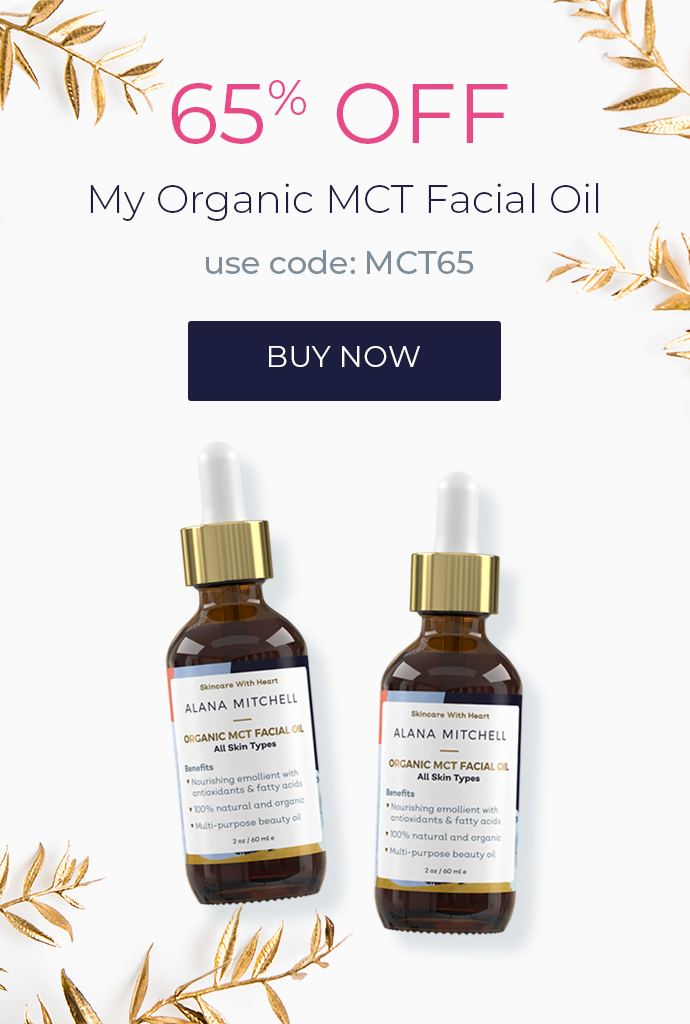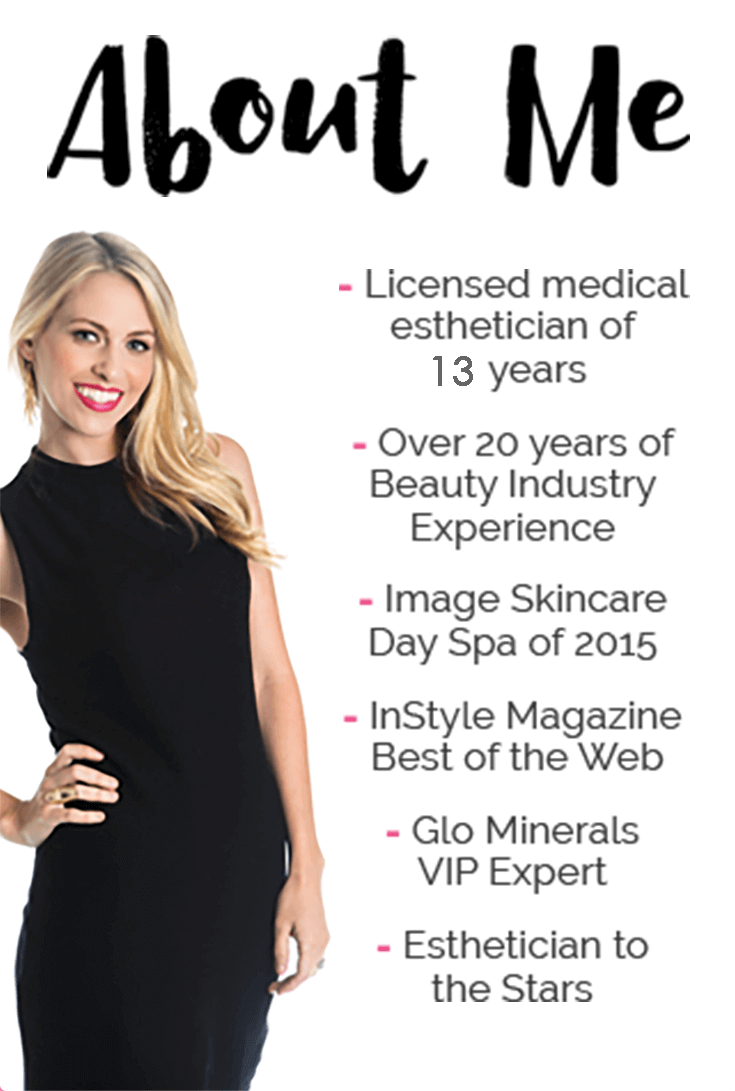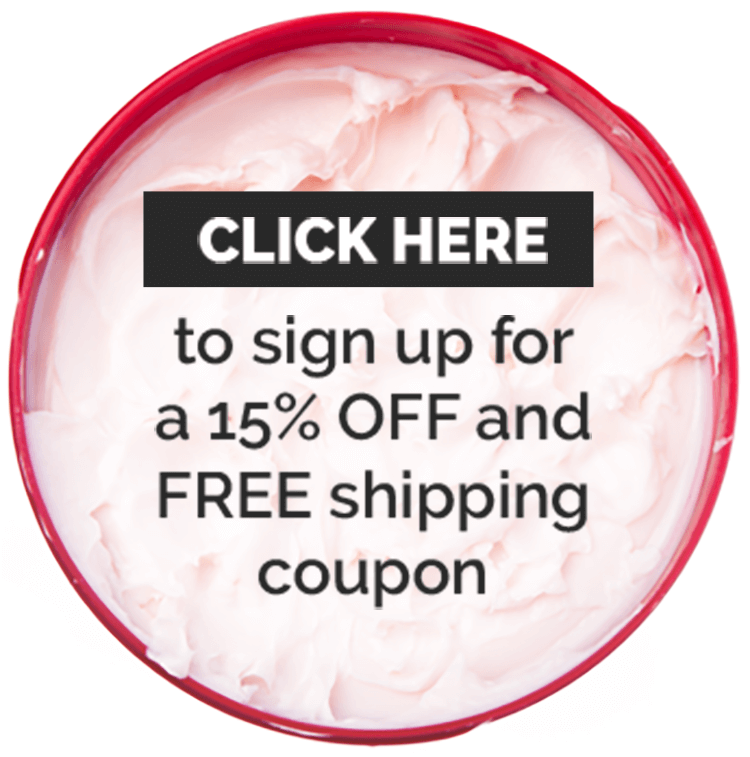What Should You Be Using In Your Skin Care Routine?
Take my quiz and get personalized recommendations from a
licensed esthetician!
The Best Ingredients For Your Skin Type
 Of all the questions I’ve received from my Beauty Mates, one of the most common is: How do I know that a product will work? The typical shopping experience involves a client looking at the packaging, loving what it says, and assuming it is the right product for them. And how could one blame them? The product has fabulous claims and such a cute exterior! The secret is pretty simple, however: the most important information about this product is on the back of the package, the ingredients list.
Of all the questions I’ve received from my Beauty Mates, one of the most common is: How do I know that a product will work? The typical shopping experience involves a client looking at the packaging, loving what it says, and assuming it is the right product for them. And how could one blame them? The product has fabulous claims and such a cute exterior! The secret is pretty simple, however: the most important information about this product is on the back of the package, the ingredients list.
The ingredients list can look a lot like a foreign language, which is why it is important to take it slow and break them down. Ingredients are listed in descending order, meaning the largest amounts will appear at the top of the list. Water, for instance, is a huge component of many skincare formulas, so you will likely see it listed as one of the top 5 ingredients. Active ingredients do tend to be at the bottom, but it is important to note that a little can go a very long way!
Know What Ingredients Do What
Kissing Acne Goodbye: The first and most important part of clearing up acne once and for all is (1) using a product that has reputable acne-fighting ingredients, and (2) finding that one product that really works well with your skin chemistry. As with any ingredient or product, just because it works for others does not necessarily it will work well on you. So, what ingredients do I recommend?
-
Sulfur – Many people are surprised when I introduce them to the idea of using sulfur-infused products, which is why I am excited to share this ingredient with you! Sulfur's main claim to fame is the fact that it acts like a sponge on the skin, absorbing excess oils that would otherwise be blocking your pores in an effort to prevent and eliminate acne. This ingredient is also great for drying up existing pimples and minimizing sebum production to minimize the chance of future breakouts. Last but not least, sulfur is surprisingly gentle, and can generally be used on sensitive skin types
always do a skin test before diving in>. - Salicylic Acid – TThis popular skincare ingredient is used in many anti-acne products, and with good reason! This particular ingredient has two major assets: (1) the fact that it can penetrate pores deeply, and (2) the fact that it can exfoliate the skin effectively. Salicylic acid sloughs away dead skin cells, clearing away buildup, dead skin, and excess oils for clearer, healthier, beautiful skin!
-
Mandelic Acid – Mandelic acid is an Alpha Hydroxy Acid
that acts as an antibacterial on the skin. This product is a wonderful alternative to salicylic acid as it provides similar benefits without penetrating the pores as deep . As if anti-acne benefits were not good enough, mandelic acid also helps to reduce fine lines and wrinkles, and brighten pigmentation.
Embrace Anti-Aging: The quest to finding the perfect anti-aging product is so difficult because so many products claim anti-aging ingredients. While a healthy skin regimen in itself is a wonderful step in slowing down the aging process, there are some ingredients that deliver more dramatic results than others. The list of anti-aging ingredients is long, but three of my consistent favorites include:
-
Glycolic Acid – Glycolic acid is yet another Alpha Hydroxy Acid
, and is best known for its small molecular structure, which allows it to penetrate the skin deeply and easily. This particular ingredient is beneficial vanishing fine lines, acne, blackheads, and excess oils while brightening up the skin. - Vitamin C – You’ve no doubt heard of the health benefits of vitamin C for your body, but did you know that this is wonderful for your skin as well? This vitamin is a wonderful antioxidant that nourishes the skin while protecting it from free radical damage. Research has also found that vitamin C can be beneficial in preventing UVB damage from the sun. This does not mean you can ditch your SPF, but it does mean you can add another fabulous ingredient in your quest to protect your skin from the sun!
- Retinol – Retinol is one of the most well-known and well-researched ingredients in the skincare industry and is one of my favorite ingredients for a number of skincare concerns. Also known as vitamin A, retinol is a powerful antioxidant that not only protects the skin from free radical damage but also helps to increase collagen production. Going beyond simply anti-aging, retinol also helps to prevent and treat acne, eczema, uneven skin tone, and wrinkles that have been triggered by sun damage. Who wouldn’t love that?!
Vanish Hyperpigmentation: Hyperpigmentation is one of the most common concerns brought to my attention by clients. Be it from the sun, natural aging, hormonal fluctuations, acne scars, or otherwise, getting balanced skin is absolutely possible with the right ingredients. Three common ingredients to look out for are:
- Kojic Acid – I absolutely love kojic acid as a skin lightener, namely because it is a natural ingredient! Kojic acid works by inhibiting the production of melanin in the deeper layers of your skin, meaning it works deep to diminish dark spots on your skin. This ingredient also has powerful antibacterial and antioxidant properties, meaning beautiful, even, healthy skin.
- Azelaic Acid – Yet another natural ingredient, azelaic acid works as a powerful lightening agent while assisting acne and rosacea sufferers as well! This particular ingredient is typically well tolerated and can be used for extended periods of time safely, making it a wonderful product to incorporate into your skincare regimen!
-
Hydroquinone – This particular lightening ingredient has caused quite a stir in the skincare world. Hydroquinone is well known for delivering fast and effective results, with little to no side effects. However, despite its benefits and efficacy, I do like my Beauty Mates to do research before deciding to use this ingredient. Hydroquinone is banned in a number of European countries, which have reported a potential risk of hydroquinone being carcinogenic and toxic to the skin. If you and your medical esthetician or dermatologist feel that the benefits of using hydroquinone outweigh any potential cons, it is important to note that it can only be used for shorter periods of time
, during which time you will need to take a set amount of months off of using any products with hydroquinone as an ingredient.
Nourish Dry Skin: Many people struggle with dry skin, be it seasonally or year-round, and one of the major complaints I receive from dry skin sufferers is that so many of the products on the market feel heavy or greasy on the skin. When it comes to soothing dry skin, I am particularly fond of:
- Ceremides – I am sure many of you are wondering what ceremides even are! Ceremides are fat molecules that can be found naturally in the top layer of your skin, and they are essential power players when it comes to moisture retention in your skin. This ingredient is especially beneficial for eczema and psoriasis sufferers and works as both a nourishing hydrator and anti-aging agent. I am a huge advocate of ceremide-infused products!
- Vitamin E – If you haven’t considered vitamin E for your dry skin, I urge you to look into it! This fat-soluble vitamin is a potent antioxidant that helps to protect your skin from free radical damage by nourishing deeply. This means that it is not only wonderful for moisturizing your skin, but it helps to slow down and reverse the common signs of aging! Vitamin E can be used topically or taken internally as a supplement. As always, consult your physician before adopting any new dietary supplement into your regimen!
- Essential Fatty Acids – Essential fatty acids come in two different forms: (1) Omega-6 Fatty Acids and (2) Omega-3 Fatty Acids. Much like vitamin E, essential fatty acids are well-known for their supplement abilities, but work wonderfully on the skin as well! They improve skin texture and softness while infusing it with moisture, and create an antimicrobial barrier against the elements, locking moisture in.
Control Oily Skin: Yet another common skincare concern 
- Kaolin Clay – Kaolin clay is wonderful for cleansing and detoxifying the skin! The high levels of silica help to remove dead skin encourage cellular turnover. It is also equipped with minerals and phytonutrients that rid the skin of toxins and oils.
- Mandelic Acid – This acne-fighting ingredient falls into the alpha hydroxy acid category, and has many benefits. Much like kaolin clay, mandelic acid exfoliates the skin to produce cellular turnover. Also, if you are a fan of the benefits of glycolic acid, but experienced harsh side effects, mandelic acid is a wonderful alternative! It has been proven to perform as effectively as glycolic acid for treating fine lines, wrinkles, and certain signs of sun damage, but has produced far less incidence of redness, irritation, flaking, and more.
- BHA’s – Beta hydroxy acids are wonderful for acne-prone, oily skin because of its ability to deeply penetrate the pores. One of the most popular BHA’s is salicylic acid, which works deep to remove blackheads and reduce oil on the skin’s surface.
Soothe Redness/Sensitivity/Inflammation: Finding products for redness, sensitivity, and inflammation can be especially difficult since you never really know how your skin will react to a product. A good rule of thumb is to choose products that have no artificial dyes, artificial fragrances, parabens, alcohol, and more. Basically: the simpler, the better. When it comes to soothing the skin, I am particularly fond of:
- Colostrum – Colostrum is packed with immune-boosting nutrients and antibodies that help the skin to regenerate. This ingredient is derived from nutrient-rich mammal milk, so be sure to look for products that are cruelty-free when shopping around for colostrum-based products. I am a huge fan of Epicuren’s Colostrum Cream.
- Arnica – I absolutely love arnica for soothing redness, sensitivity, and inflammation! I have successfully used this ingredient topically to soothe muscle aches, bruises, swelling, insect bites, and acne, and couldn’t appreciate it more! My one suggestion would be to avoid using arnica on broken skin at all costs. Also, if you happen to purchase arnica oil in its undiluted state, be sure to research how to properly dilute it in a carrier oil or lotion, as using pure arnica oil can have severe side effects!
- Allantoin – Always read the instructions before applying an allantoin product, as some require a priming routine for the product to work effectively.
Top Brands
New Brands

Recent Posts

Are You Taking the Right Steps to Care for Your Skin?
Take the Quiz
Skincare Secrets!
10-step guide for healthy, beautiful skin after kids.
100% privacy. I will never spam you!














